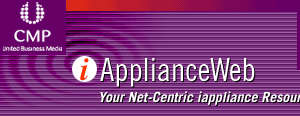



 |
 |
|
|
 |

|
||
|
|
|
|
|||

|
JavaOne RoundUp: Wireless iAppliance Is KingBy Bernard Cole San Francisco, Ca. - If product introductions at the premier Java technology conference last week have any theme, it was a shift in a major way to enabling Java operation on small footprint wireless iAppliances and building the Web Services infrastructure that makes this possible. In addition to taking the first steps toward making Java a truly open source language standard, Sun announced at the conference a number of initiatives and products aimed at driving web services down to mobile and small footprint client iAppliance devices such as cell phones, wired PDAs, settop boxes and residential gateways. This was supported by a range of product introductions by companies focused in the same direction. At Java One, Sun representatives said the company would bundle Forte for Java wireless toolkit, Java blueprints and APIs based on the new Java Specification Request (JSR) approved by the Java Community ProcessSM (JCPSM) to make it even easier for developers to create and display web services to the modern client and small devices. In addition, the company said it was working with expert groups in the JCP to develop a small device web service specification, called JSR #172. Submitted by the Java Community Process Executive Committee, JSR 172 is endorsed by leading Java tool vendors, including Sun (Forte for Java), Oracle (JDeveloper), Metrowerks (CodeWarrior for Java) and Borland (JBuilder), who are supporting this specification in future versions of their products, along with device manufacturers including RIM, Siemens, Symbian, Nokia and Motorola. Sun will provide details on distribution of APIs within the next 90 days. According to Rich Green, vice president and general manager, Java and XML Software, Sun Microsystems, the aim of the JCP JSR #172 is to extend Web services standards, including the extensible mark-up language (XML), simple object access protocol (SOAP), and communication with registries and repositories like UDDI and ebXML, to networked mobile and consumer devices. The JCP Executive Committee will oversee several specification review cycles and the specification lead for JSR #172 estimates that this effort will be ready for final Executive Committee approval in Summer 2003. More detailed information on the JSR #172 filing can be found at http://jcp.org/jsr/detail/172.jsp Application Verification Kit Available Made available for the first time at the conference by Sun was a Java 2 Enterprise Application Verification kit, designed to make sure that applications running on a J2EE Web Services-based application server work across different server implementations of J2EE. Sun is supplying a J2EE Application Verification Kit and a beta program consisting of binary tools such as a static code tool, the instrumented J2EE reference implementation, a reporting tool and supporting documentation. The kit is available immediately from Sun's web site at http://java.sun.com/j2ee/avk/. The AVK helps analyze J2EE technology-based applications to identify platform specific code use as well as violations of the J2EE specification. The report tool that is included in the kit generates detailed logs that can be used to pinpoint these problem areas. Sun And Arm Boost Java Speeds Ten-fold Collaborating with CPU vendor ARM Ltd., Sun announced it had developed new Virtual Machine (VM) solutions that exponentially improve the performance of small footprint net-centric Java-based devices. Code-named Project Monty, the alternative configurations are expected to boost performance via capabilities designed for Java's Connected Limited Device Configuration (CLDC) and Connected Device Configuration (CDC)/Dynamic Compiler up to 10 times higher than existing virtual machine technologies in a very small footprint. The new virtual machine solutions are designed to work with ARM microprocessors, as well as other microprocessor designs, and will complement the ARM Jazelle technology. CDC/Dynamic Compiler is tailored for high-end PDAs and communicators, game consoles, web tablets, TV set-top boxes and automotive telematics systems, and it is well suited for solutions that need higher-end features than available in CLDC, but where memory footprint is still constrained. Mobile Version of Forte/NetBeans Offered In addition to companion products targeted at the desktop and server, Sun has also released Forte for Java 4, Mobile Edition, a compact integrated development environment (IDE) optimized for developers building applications targeting the JavaTM 2 Platform, Micro Edition (J2ME) for mobile devices. Forte for Java 4, Mobile Edition, is based on the NetBeans (see iAppliance Insight) open source platform, will be offered at no charge via download from the Sun Web site. Forte for Java 4, Mobile Edition is optimized for J2ME (MIDP/CLDC) development. Mobile Information Device Protocol (MIDP) is a set of Java APIs which, together with the Connected Limited Device Configuration (CLDC) -- a J2ME configuration that serves as the foundation of the Java runtime environment for small, resource-constrained devices -- provides a complete J2ME application runtime environment targeted at mobile devices. The NetBeans IDE is tightly integrated with the J2ME Wireless Toolkit, which provides developers with a default emulation environment, documentation and examples needed to develop CLDC/MIDP-compliant applications. The J2ME Wireless Toolkit preferences and utilities are presented as menu selections in the IDE, or they can be controlled from the IDE command-line interface. Integrated with Forte for Java 4, Mobile Edition, the J2ME Wireless Toolkit also provides support for source-level debugging. Other features of Forte for Java 4, Mobile Edition include wizards and source-level debugging; menu-driven access and integrated emulators; and a unified Emulator Interface. Information about the Forte for Java IDE will be available on the Sprint PCS Application Developer's Program website, http://developer.sprintpcs.com. The early access release of Forte for Java 4, Mobile Edition is available immediately at no charge at http://forte.sun.com/eap/. Tira And Mobilitec Target Wireless iAppliances Tira Wireless Inc. (www.tirawireless.com), a full service publisher of certified J2ME applications and Mobilitec Inc. (www.mobilitec.com), provider of platforms for over-the-air (OTA) provisioning and billing for J2ME and dynamic content have joined forces to provision iAppliance devices. Together they plan installation of a complete end-to-end Java publishing and provisioning solution for Mobile Operators. Mobilitec is providing its mPower, a carrier-grade platform for OTA delivery, management, and charging for wireless applications and other multiple types of dynamic content for mobile devices. The combined solution reduces the risk and increases the speed by which Mobile Tira's publishing service includes acquiring applications and content, hosting, testing, certifying application quality, and managing end-user support and feedback. As part of the certification process, For more information on the joint offering go to www.tira.com and www.mobilitec.com. Siemens Offers Mobile Software Toolkit To support its plans to market two new mobile phones - the M46 in the U.S. and the M50 in Europe and Asia, Siemens has developed a Mobility Toolkit available at no cost to developers and focused on developing net-centric iAppliance applications based on the Java Platform 2, Micro Edition (J2ME). The SMTK is compliant with the Mobile Information Device Profile (MIDP), as well as the Connected Limited Device Configuration (CLDC), to provide a complete J2ME application runtime environment targeted at mobile information devices, such as mobile phones. The JEME-based mobile phones will feature access to a number of gaming and entertainment features, including instant messaging, animation and multiplayer games, as well as others that users can download, store, play and exchange applications at their discretion. To enable fast downloads of Java applications, the M46 and M50 also will feature GPRS (General Packet Radio Service) Class 8 technology to support high-speed wireless data access. The SMTK includes a phone emulator, API (Application Program Interface) class libraries and documentation, a programmer's reference manual, source code examples, and IDE (Integrated Development Environment) plug-ins. The SMTK serves a larger segment of the development community by plugging in to Sun Microsystems' Forte for Java, Borland's JBuilderMobileSet and Metrowerks' CodeWarrior for Java. Siemens also has a dedicated Web site for developers at www.siemens.com/mobile-partners and has made the SMTK available for free download on this site. Interested developers may also buy the SL45i and other Siemens mobile phones with Java technology as they become available. Softwired Links Java and .NET in Wireless iAppliances At JavaOne Softwired Inc. introduced an upgraded version of its iBus//Mobile messaging middleware for use on mobile devices based on J2ME that allows information to flow back and forth between Java-based iAppliances and backend systems that might be based on Microsoft Corp.'s .NET. Based on the Java Message Service (JMS) specification, the iBus//Mobile product allows information to flow reliably between mobile devices and backend business systems either as either as backend .NET-based applications or as client applications running on PocketPC-based communicator devices. Whether Java or .NET, developers use the Java Message Service (JMS) API to reliably exchange messages in a Queuing or Publish/Subscribe style interaction, and let the iBus middleware deal with store and forward, packet loss recovery on mobile networks or devices roaming between different styles of mobile networks. Key features of the tool are the iBus JMS Lite Connector client (called JMS LC): A small-footprint (12K) JMS client library allowing MIDP devices to send and receive JMS messages over HTTP; support for SOAP via JMS invocation; a SOAP-based JMS API to allow applications to send and receive JMS messages through a SOAP interface, without the need for installation of a JMS client library need be installed. For more information go to www.softwired.com. |
|
||||||||

Terms and Conditions Privacy Statement |
||||||||||